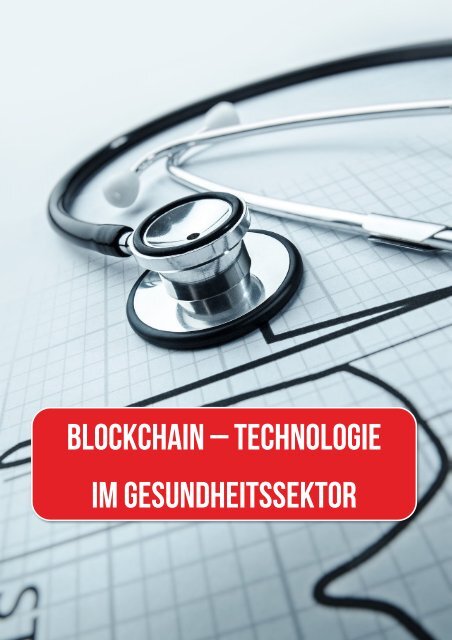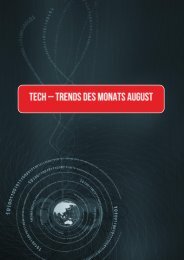Blockchain Technologie im Gesundheitssektor
Create successful ePaper yourself
Turn your PDF publications into a flip-book with our unique Google optimized e-Paper software.
<strong>Blockchain</strong> – <strong>Technologie</strong><br />
Im <strong>Gesundheitssektor</strong>
Wie die Handhabe von<br />
Patientenakten durch<br />
<strong>Blockchain</strong>-<strong>Technologie</strong><br />
revolutioniert werden kann<br />
Es ist kein Gehe<strong>im</strong>nis, dass der<br />
<strong>Gesundheitssektor</strong> sich nur langsam der<br />
Digitalisierung nähert. Vor allem<br />
regulatorische Aspekte wie zum Beispiel<br />
der Umgang mit sensiblen Daten führen<br />
dazu, dass dieser Bereich dem<br />
Innovationstempo (z.B. in der<br />
Unterhaltungs- oder Finanzbranche)<br />
hinterherhinkt. Viele der bestehenden<br />
Systeme sind zudem fragmentiert und<br />
veraltet; vor allem wenn es darum geht<br />
Patientendaten sicher elektronisch zu<br />
teilen.<br />
Teilen von Gesundheitsdaten in<br />
Zeiten der Digitalisierung<br />
Jeder der mal umgezogen ist hat den<br />
umständlichen Ablauf und das Fehlen<br />
eines reibungslosen Datentransfers aus<br />
erster Hand erlebt. Immer wenn man eine<br />
neue Praxis aufsucht, müssen die<br />
medizinischen Daten erneut angegeben<br />
werden. Bis dato würde die neue Praxis<br />
Patienteninformationen vom vorherigen<br />
Arzt anfordern. Die Informationen kämen<br />
dann per Fax oder sogar per Post.<br />
Man erkennt daran leicht, wie dringend<br />
das Thema Digitalisierung für den<br />
<strong>Gesundheitssektor</strong> ist. Dank moderner<br />
Technik gibt es bei diesen Prozessen<br />
nach und nach Verbesserungen.<br />
Namentlich geht es dabei um ‚Push‘- ‚Pull‘-<br />
und ‚View‘- Funktionen, mit denen man<br />
Daten, senden oder anfordern kann.<br />
Leider sind diese Prozesse meistens nicht<br />
standardisiert und ihre Datensicherheit<br />
kann nicht garantiert werden. Darüber<br />
hinaus bedarf es der erforderlichen und<br />
korrekten Infrastruktur, um Daten senden<br />
oder empfangen können.<br />
How <strong>Blockchain</strong> Can<br />
Revolutionise Patient Data<br />
Records<br />
It’s no secret that healthcare has been one<br />
of the slowest sectors to digitalize.<br />
Steeped in regulation and handling so<br />
much sensitive data, it doesn’t stand a<br />
chance of keeping up with the speed of<br />
innovation we observe in entertainment or<br />
the financial industry. Many of the<br />
frameworks in place today are fragmented<br />
and outdated; particularly when it comes<br />
to securely sharing patient data records<br />
electronically between various<br />
stakeholders.<br />
Sharing Electronic Health Records<br />
Anyone who has relocated to a new city<br />
will have experienced this lack of<br />
seamless data transfer first-hand; when<br />
registering as a patient at a new clinic or<br />
surgery, you are usually required to<br />
provide your medical data again. Until<br />
recently, Health practitioners would call<br />
your previous Doctor’s office to request<br />
patient information, which would then be<br />
sent by fax (or even by post). It was easy<br />
to see how greatly this area of healthcare<br />
was in need of digital transformation.<br />
Gradually technology has allowed for<br />
development in these processes; namely<br />
‘Push’, ‘Pull’ and ‘View’ functions to send<br />
or request data from another party.<br />
However, these processes are often not<br />
standardized and cannot guarantee data
Sicherer Datentransfer mit<br />
<strong>Blockchain</strong>-<strong>Technologie</strong><br />
<strong>Blockchain</strong> bietet die Möglichkeit,<br />
medizinische Daten grenzenlos über die<br />
verschiedensten Kanäle zu teilen, ohne<br />
die Privatsphäre des Patienten oder die<br />
Sicherheit der Daten zu beeinträchtigen.<br />
Ransomware-Angriffe, wie z.B. auf die<br />
NHS in Großbritannien dienen als Beispiel<br />
dafür, wie gefährdet bestehende<br />
Gesundheitssysteme sind. Viele der<br />
medizinischen Daten werden isoliert<br />
aufbewahrt, was sich <strong>im</strong> Falle des Angriffs<br />
als extrem unvorteilhaft herausstellte, da<br />
Krankenhäuser so quasi aus ihrem<br />
eigenen System ausgesperrt wurden. Mit<br />
<strong>Blockchain</strong>-<strong>Technologie</strong>, die dafür sorgt,<br />
dass alle Informationen verteilt und<br />
verschlüsselt werden, hätte eine<br />
Cyberattacke dieser Art verhindert werden<br />
können.<br />
Auch darüber hinaus existieren in der<br />
Gesundheitsindustrie viele nützliche<br />
Anwendungsmöglichkeiten für <strong>Blockchain</strong>-<br />
<strong>Technologie</strong>. Von Rezepten bis zum<br />
Teilen von klinischen und administrativen<br />
Daten. Sogar Daten, die von Patienten<br />
durch tragbare Gegenstände und IoT-<br />
Fitness-Produkte generiert werden,<br />
können mit Hilfe der <strong>Blockchain</strong> geteilt<br />
werden. Aktuell stehen diesen<br />
Entwicklungen noch einige Steine <strong>im</strong> Weg,<br />
da die Implementierung einige<br />
Herausforderungen birgt. Viele bereits<br />
existierende Infrastrukturen unterstützen<br />
<strong>Blockchain</strong>-<strong>Technologie</strong> nicht und<br />
benötigen eine komplette Überholung,<br />
damit das System durch ein<br />
integrity. They also rely on the other party<br />
having the correct infrastructure in place to<br />
send or receive data.<br />
Secure Data Transfer with<br />
<strong>Blockchain</strong><br />
<strong>Blockchain</strong> offers a way to enable<br />
unl<strong>im</strong>ited sharing of medical records<br />
across multiple channels, without<br />
compromising patient privacy or data<br />
integrity. The recent ransomware attacks<br />
on the NHS in the UK are an example of<br />
how vulnerable existing healthcare<br />
systems can be; many medical data<br />
sources are isolated, which came as a<br />
great disadvantage to the hospitals which<br />
were targeted and locked out of their own<br />
systems. Because <strong>Blockchain</strong> allows<br />
information to be distributed and<br />
encrypted, it could have prevented a<br />
cyber-attack of this kind.<br />
There are many useful applications of<br />
<strong>Blockchain</strong> within the healthcare industry,<br />
from prescriptions to clinical data sharing,<br />
administrative data and even patient<br />
generated data from wearables and IoT<br />
fitness products. However, this does not<br />
come without challenges. The biggest one<br />
for <strong>Blockchain</strong> innovation is<br />
<strong>im</strong>plementation; many existing<br />
infrastructures do not support <strong>Blockchain</strong><br />
technology, and would require a complete<br />
overhaul to replace frameworks with a<br />
decentralized, cryptographically secure<br />
system.<br />
In January, this year IBM Watson Health<br />
announced a research initiative together<br />
with the FDA exploring the use of<br />
<strong>Blockchain</strong> frameworks for health care<br />
data, with a focus in oncology. Their<br />
collaboration is set to further propel the<br />
use of <strong>Blockchain</strong> for patient record<br />
sharing, in addition to raising awareness<br />
about the benefits of these types of<br />
databases.
dezentralisiertes und kryptographisch<br />
geschütztes Netzwerk ersetzt werden<br />
kann.<br />
Im Januar 2017 kündigte IBM Watson<br />
Health eine Forschungsinitiative<br />
zusammen mit dem amerikanischen<br />
Gesundheitsministerium an, um die<br />
Verwendung von <strong>Blockchain</strong>-Netzwerken<br />
für medizinische Daten zu erforschen. Der<br />
Fokus liegt dabei auf der Onkologie. Diese<br />
Kollaboration soll den Gebrauch von<br />
<strong>Blockchain</strong>-<strong>Technologie</strong> be<strong>im</strong> Teilen von<br />
Patientendaten vorantreiben. Außerdem<br />
ist es das erklärte Ziel ein Bewusstsein für<br />
die Vorteile dieser Art von Datenbank zu<br />
schaffen.<br />
Patientendaten - Eine andere<br />
Herangehensweise<br />
Andere Firmen erforschen ähnliche<br />
Lösungen wie die <strong>Blockchain</strong>. DeepMind<br />
Health nutzt Künstliche Intelligenz (KI), um<br />
Werkzeuge für eine bessere<br />
Zusammenarbeit in der<br />
Gesundheitsbranche zu bauen. Das Ziel<br />
ist es, einen digitalen Ledger zu bauen,<br />
der direkt und automatisch jegliche<br />
Interaktion, die mit Patientendaten zu tun<br />
hat, kryptographisch verifizierbar<br />
aufn<strong>im</strong>mt.<br />
Das verwendete System basiert teils auf<br />
<strong>Blockchain</strong>-<strong>Technologie</strong> <strong>Technologie</strong>, die<br />
bei Bitcoin genutzt wird und verspricht<br />
Vorteile <strong>im</strong> Hinblick auf Privatsphäre und<br />
Transparenz. Die Vision ist, dass alle<br />
Patienten jede Änderung ihrer Daten<br />
einsehen können. Die Lösungen in diesem<br />
Bereich sind zwar noch nicht fertig<br />
entwickelt, wir halten es jedoch für<br />
erstrebenswert, wenn Patienten ihre<br />
eigenen Daten besäßen, damit sie die<br />
Kontrolle und Entscheidungsgewalt<br />
darüber haben, mit wem sie diese teilen<br />
wollen. Es wird daher interessant sein die<br />
Fortschritte weiter zu beobachten.<br />
A Different Approach to Patient<br />
Data<br />
Other companies are exploring s<strong>im</strong>ilar<br />
solutions to <strong>Blockchain</strong>, but from a slightly<br />
different angle. DeepMind Health is a<br />
subsidiary company from Google, which<br />
uses AI technology to build tools for<br />
collaboration between healthcare<br />
professionals. Their objective is to create a<br />
digital ledger which will automatically<br />
record each interaction related to patient<br />
data in a manner that is cryptographically<br />
verifiable.<br />
Their system is loosely based on the<br />
<strong>Blockchain</strong> technology used by Bitcoin, but<br />
they approach it differently, arguing that<br />
this type of health data does not need to<br />
be decentralized. They have a strong<br />
focus on security, privacy and<br />
transparency, and ult<strong>im</strong>ately wish to let<br />
patients see any changes to their own<br />
data. Their solution is not yet complete<br />
from a technological perspective, so it will<br />
be interesting to watch their progress in<br />
this space. We believe that DeepMind is<br />
right with their vision for patients to own<br />
their own data and empowering users to<br />
take back control of how their data is<br />
shared. This can be achieved by using<br />
<strong>Blockchain</strong> technology, making it a vision<br />
that can become reality for the healthcare<br />
very soon.




